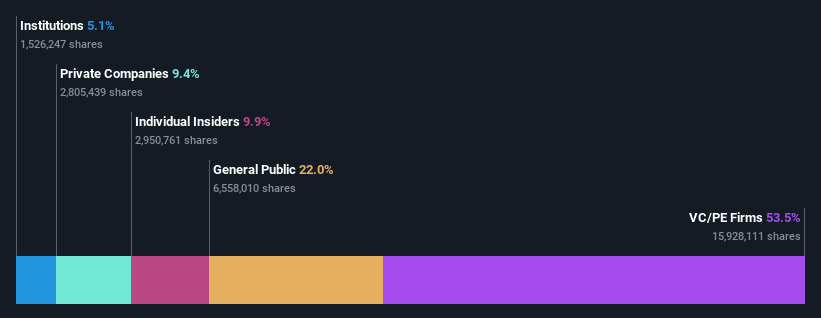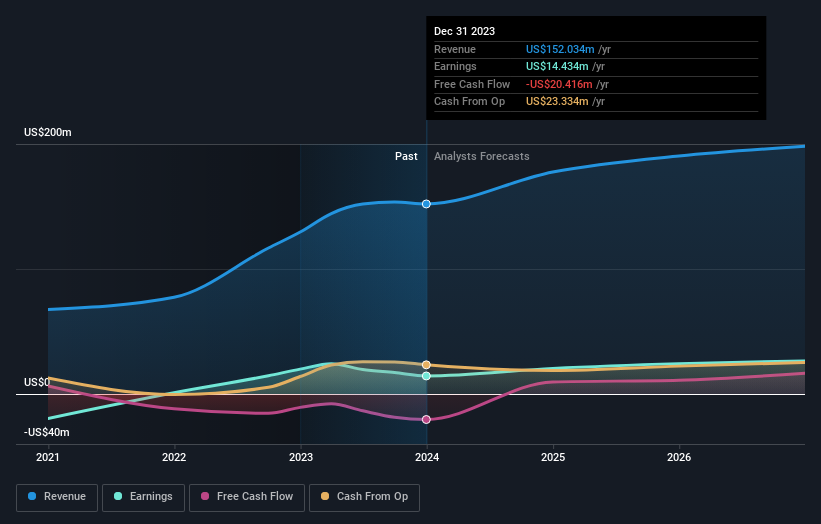Drilling Tools International Corporation's (NASDAQ:DTI) market cap surged US$17m last week, private equity firms who have a lot riding on the company were rewarded
Key Insights
Drilling Tools International's significant private equity firms ownership suggests that the key decisions are influenced by shareholders from the larger public
54% of the company is held by a single shareholder (Hicks Equity Partners LLC)
Past performance of a company along with ownership data serve to give a strong idea about prospects for a business
Every investor in Drilling Tools International Corporation (NASDAQ:DTI) should be aware of the most powerful shareholder groups. With 54% stake, private equity firms possess the maximum shares in the company. In other words, the group stands to gain the most (or lose the most) from their investment into the company.
As a result, private equity firms collectively scored the highest last week as the company hit US$157m market cap following a 12% gain in the stock.
In the chart below, we zoom in on the different ownership groups of Drilling Tools International.
Check out our latest analysis for Drilling Tools International
What Does The Institutional Ownership Tell Us About Drilling Tools International?
Institutional investors commonly compare their own returns to the returns of a commonly followed index. So they generally do consider buying larger companies that are included in the relevant benchmark index.
We can see that Drilling Tools International does have institutional investors; and they hold a good portion of the company's stock. This suggests some credibility amongst professional investors. But we can't rely on that fact alone since institutions make bad investments sometimes, just like everyone does. It is not uncommon to see a big share price drop if two large institutional investors try to sell out of a stock at the same time. So it is worth checking the past earnings trajectory of Drilling Tools International, (below). Of course, keep in mind that there are other factors to consider, too.
We note that hedge funds don't have a meaningful investment in Drilling Tools International. Our data shows that Hicks Equity Partners LLC is the largest shareholder with 54% of shares outstanding. This implies that they have majority interest control of the future of the company. Meanwhile, the second and third largest shareholders, hold 9.3% and 4.9%, of the shares outstanding, respectively. Additionally, the company's CEO R. Prejean directly holds 1.5% of the total shares outstanding.
While studying institutional ownership for a company can add value to your research, it is also a good practice to research analyst recommendations to get a deeper understand of a stock's expected performance. There is some analyst coverage of the stock, but it could still become more well known, with time.
Insider Ownership Of Drilling Tools International
The definition of an insider can differ slightly between different countries, but members of the board of directors always count. The company management answer to the board and the latter should represent the interests of shareholders. Notably, sometimes top-level managers are on the board themselves.
I generally consider insider ownership to be a good thing. However, on some occasions it makes it more difficult for other shareholders to hold the board accountable for decisions.
Our most recent data indicates that insiders own some shares in Drilling Tools International Corporation. As individuals, the insiders collectively own US$16m worth of the US$157m company. Some would say this shows alignment of interests between shareholders and the board, though we generally prefer to see bigger insider holdings. But it might be worth checking if those insiders have been selling.
General Public Ownership
The general public, who are usually individual investors, hold a 22% stake in Drilling Tools International. While this size of ownership may not be enough to sway a policy decision in their favour, they can still make a collective impact on company policies.
Private Equity Ownership
Private equity firms hold a 54% stake in Drilling Tools International. This suggests they can be influential in key policy decisions. Sometimes we see private equity stick around for the long term, but generally speaking they have a shorter investment horizon and -- as the name suggests -- don't invest in public companies much. After some time they may look to sell and redeploy capital elsewhere.
Private Company Ownership
We can see that Private Companies own 9.4%, of the shares on issue. It might be worth looking deeper into this. If related parties, such as insiders, have an interest in one of these private companies, that should be disclosed in the annual report. Private companies may also have a strategic interest in the company.
Next Steps:
It's always worth thinking about the different groups who own shares in a company. But to understand Drilling Tools International better, we need to consider many other factors. Take risks for example - Drilling Tools International has 3 warning signs (and 1 which is potentially serious) we think you should know about.
If you are like me, you may want to think about whether this company will grow or shrink. Luckily, you can check this free report showing analyst forecasts for its future.
NB: Figures in this article are calculated using data from the last twelve months, which refer to the 12-month period ending on the last date of the month the financial statement is dated. This may not be consistent with full year annual report figures.
Have feedback on this article? Concerned about the content? Get in touch with us directly. Alternatively, email editorial-team (at) simplywallst.com.
This article by Simply Wall St is general in nature. We provide commentary based on historical data and analyst forecasts only using an unbiased methodology and our articles are not intended to be financial advice. It does not constitute a recommendation to buy or sell any stock, and does not take account of your objectives, or your financial situation. We aim to bring you long-term focused analysis driven by fundamental data. Note that our analysis may not factor in the latest price-sensitive company announcements or qualitative material. Simply Wall St has no position in any stocks mentioned.

 Yahoo Finance
Yahoo Finance 

